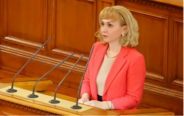2020 marked the 15th anniversary of the establishment of the Ombudsman institution in Bulgaria. Fifteen years in which the national public advocate has forged, day after day, year after year, honest, genuine, meaningful, and functional links to the citizens. A relationship that is based on trust, respect, commitment, and aspiration to help every person seeking and relying on support from the Ombudsman institution.
Incidentally, the 15th anniversary of the Ombudsman institution witnessed, regrettably, a record high number of citizen complaints. 2020 demonstrated most clearly the huge need for the Ombudsman institution and the significance of its existence. Nearly 60,000 people approached it with their problems, concerns, and pain. One reason for such a high level of public confidence in the institution was the unprecedented COVID-19 pandemic which has ruthlessly claimed millions of human lives across the world and has caused a severe health, social, and economic crisis in this country as well.
The crisis, in turn, dealt a heavy blow to fundamental rights and not just to the rights of the vulnerable groups – the elderly and helpless people, disadvantaged people, the poor, the sick, and the people living alone, children in and out of
institutions, but also to society as a whole. This was a most challenging year for all of humanity and Bulgaria is no exception. In striving to protect citizens' lives and health, the executive, legislative, and judicial branches of power had to respond to the challenges by introducing unpopular measures and emergency legislation.
These, however, were not unequivocally accepted. A key priority for the Ombudsman and her team has been the keeping of strict watch over the compliance with the principle of observing balance and proportionality to prevent unlawful restrictions on or deprival of fundamental human rights. It is, indeed, true that restricting or suspending certain fundamental rights during a state of emergency is admissible in accordance with Article 15 of the European Convention for the Protection of Human Rights and Fundamental Freedoms (ECHR). It is also true, however, that the application of emergency measures derogating from human rights is temporary and of clearly time-limited duration.
It makes perfect sense, therefore, that the number of recommendations and opinions issued by the Ombudsman to central and municipal authorities and to public service providers was 30 percent higher just in the first two months of lockdown compared to the same period in 2019. In order for us, as an institution, to succeed in responding and helping all citizens approaching the Ombudsman institution with a request for succour, support, or assistance during the state of emergency,
the Ombudsman's experts’ mobile phone numbers were published on the Ombudsman's website and they were practically available 24/7 to all citizens to address their problems. By the way, this still holds true today and will continue to be the case in the future.
The issues referred to the Ombudsman in 2020, were no different from those in previous years. They were, however, appreciably aggravated due to the СOVID-19 crisis – thousands of families were left without a regular source of income as many sectors were shut down. The number of complaints against the unlawful conduct on the part of collection agencies, payday loan companies, and monopolies, as well as complaints concerning impeded access to healthcare, education, and social services significantly increased.
And right in the middle of this difficult and complex situation, when citizens needed, more than ever, to have their rights and freedoms safeguarded, an attempt was made at "reformulating" the Ombudsman’s powers and at depriving, in practice, citizens of protection. Following the Ombudsman's clamorous public outcry, the part concerning the Ombudsperson in the new draft Constitution (which, after all, never saw the light of day) was restored to its previous version as approved by a number of international institutions during the accreditation process where our institution received the highest attainable UN status accreditation.The attempt at reducing the Ombudsman to a mere observer of the rights and freedoms met with my outright resistance. It became apparent, once again, that fundamental rights and freedoms cannot be taken for granted and people have to fight for them and to defend them relentlessly and without hesitation every day.
The Ombudsman's Annual Report for 2020 can be downloaded below.
Source: Ombudsman of the Republic of Bulgaria

